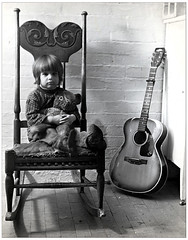Speaking of music industry stupidity,
forcing Olga and others to remove guitar tablature was an ignorant decision. Now, a company is trying to commercialize tablature, using transcriptions created by others. Seems like theft, but maybe there's more to it. If I had transcribed some Velvet Underground song (for example), uploaded it to a tab site like Olga, and now some company was selling this same transcription (or more precisely, selling advertising where the tab is being displayed), I'd be pissed off.

E-Commerce Report: Hoping to Move Guitar Notations Into the Legal Sunshine
A popular system for teaching and learning guitar online will enter the legitimate business realm for the first time.
ast year popular sites like Olga.net, MxTabs.net and others — where users post tablature, usually called “guitar tabs,” for rock songs — suspended operations after the music publishing industry threatened them with copyright infringement lawsuits. Under the new initiative, MxTabs, which is owned by MusicNotes, will share an undisclosed portion of advertising revenue with music publishers, who in turn will give a portion to artists.
The effort could face a chicken-or-egg problem, in that publishers may balk if they do not see enough potential for advertising revenue, and advertisers may balk if publishers do not free enough of their music to attract a big audience. Advertising analysts suggest the revenue could be significant, but even a little is better than none.
“It’s a huge opportunity, in that this is a revenue stream publishers haven’t had before,” said Gary L. Churgin the chief executive of Harry Fox Agency. “In a sense, the sky’s the limit.”
The initiative is still in the early stages, and Mr. Churgin has not yet formally asked publishers if they would like to participate. Artists are even less familiar with the agreement.
yeah, no shit the revenue stream didn't exist before: how could it? Why not just break into people's houses and steal their notebooks, and publish those too?
I like how the artist always gets the short stick in the eye:
The initiative is still in the early stages, and Mr. Churgin has not yet formally asked publishers if they would like to participate. Artists are even less familiar with the agreement.
Music publishers, of course, love the idea of making money off of consumers and music fans/students without having to do anything extra.
Mr. Robinson, whose company represents Linda Perry, a songwriter for Christina Aguilera and Pink among others, said that about 2 percent of the songs in the company’s catalog have licensed guitar tablature associated with them.
For the remaining songs in Famous Music’s catalog — and the vast majority of the music publishing industry’s collective catalog — there is insufficient demand to justify the costs of publishing tablature.
As a result, guitarists who want to know how to play less mainstream songs have gone to sites where amateurs post tablature. Under this agreement, MusicNotes, publishers and artists will essentially earn money from an army of volunteers, who are creating content that the publishers are not creating on their own.
Tim Reiland, chairman and chief financial officer of MusicNotes, which is based in Madison, Wis., said publishers would receive “a very healthy split” of the advertising dollars.
“We’ve got lots of work here to get the publishers signed up, but we think they should,” Mr. Reiland said. “We think it’s a good deal.”
MusicNotes bought MxTabs.net, one of the most popular guitar tablature sites, last year as it came under legal attack by music publishers. Publishers claimed that even incorrect versions of music notation violate copyright laws, since the postings represent “derivative works” related to the original compositions, to use the legal parlance.
The guitar tablature sites were typically small operations, running on little more than revenue gleaned from Google text ads. Many shut down rather than challenge the publishers in court. (Ultimate-Guitar.com, which has a New Jersey phone number but claims that it is based in Russia and that it complies with Russian copyright laws, still operates. Its advertisers include AOL, T-Mobile and Dell, among others.)
not to mention getting more data on the people who visit the site:
Ms. Marsh said the site “already has a lot of interest” from advertisers. “This demographic — teenage boys to young adults — is very similar to the demographic for gaming. There are a lot of advertisers who are interested in that group.”
Shar VanBoskirk, an analyst with Forrester Research, said tablature sites could also join other online publishers and anonymously track the Internet travels of their users. The budding guitar players might somehow show that they were shopping for a car, for instance, or other expensive goods. Suddenly, she said, “these users are really valuable targets for sellers of all kinds.”
Technorati Tags: copyright











